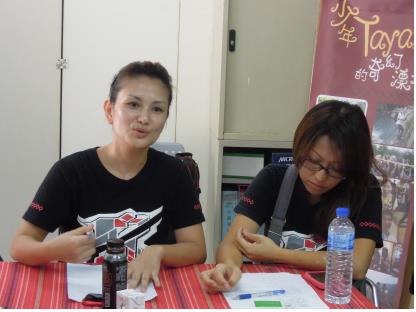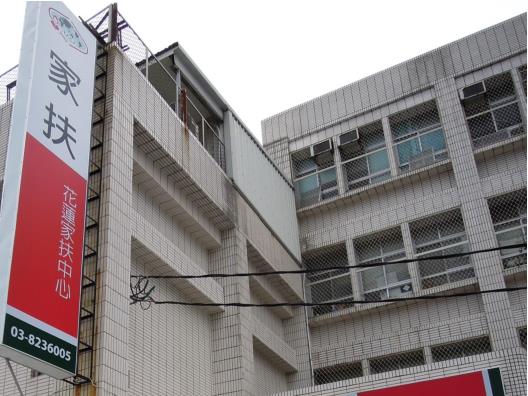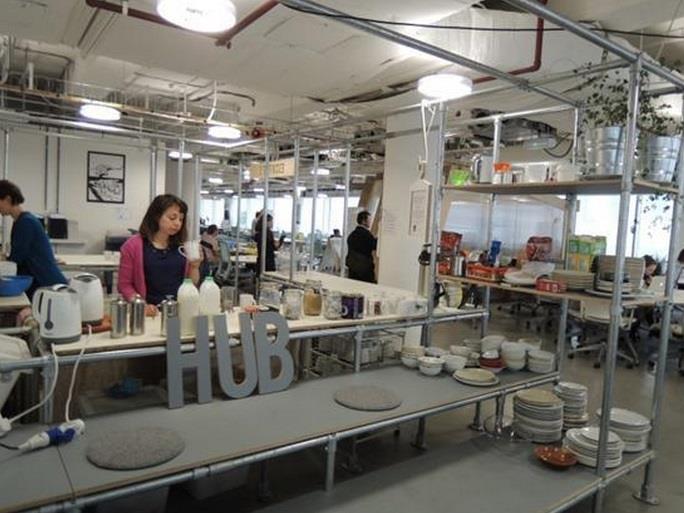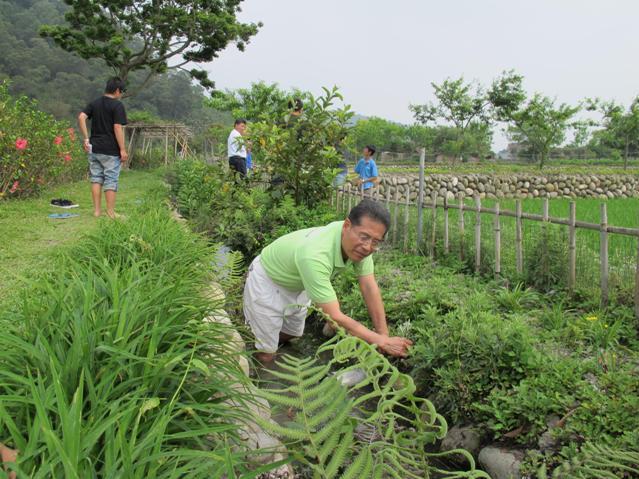Community development
Community development
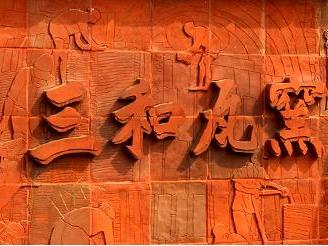
Home/Tag/Community development
The Essence of Tiles: San-he Tile Kiln, Building Cozier Homes
To boost the development of the tile industry and promote the use of traditional Taiwanese building materials, the Dashu Tile Kiln Society, San-he Tile Kiln, and San-he Tile Kiln Culture & Art Ltd., which was founded by multiple partners*, have joined together to launch a series of cultural and creative products based on traditional tiles and educate the public about ceramic tiles through various hands-on activities and distribution of educational materials. San-he Tile Kiln is a down-to-earth company full of hardworking, likeminded people. We make good use of resources to create practical products with a creative twist. San-he Tile Kiln is a principled working environment where people are free to pursue peace and contentment, all while creating warm, cozy homes that bring happiness to our employees and customers.
The Essence of Tile: Made with Local Materials
Walking beside the display wall built by recycled building materials with traditional construction methods, you can’t help but feel close to the land. This was originally a site for placing clay for the kiln. Under the concerted efforts of the Dashu Tile Kiln Society and the Sanhe Tile Kiln, this space has gradually been transformed into an exhibition of traditional building materials and construction methods.
Adjacent to Dashu Township, the Gaoping River provides fine materials with perfect moisture for the tile kiln industry. In a time when reinforced concrete has replaced tiles, in Dashu, only San-he is still making tiles. To store the ever rarer clay, the tile kiln has specially laid out this space. The volunteer guide of the Society points out the iron sheet above, saying that they built the roof to decrease clay loss and its impact on the environment on rainy days. Because making tiles is done by wood burning, the kiln receives old boat decks and waste wood from all parts of the country. Some of these historic materials are ideal materials to build a “Taiwanese Traditional Construction Methods Museum.”
Li Jun-hong, chairman of the Society, recalls the reason why he invested in this business. It was simply for his family. Playing with mud from a young age, Li knew his mother and uncle worked very hard making tiles. He was worried their bodies might be overburdened by the hard work, so he decided to return home and run the kiln. Li also has a special feeling towards traditional Taiwanese construction materials, and he felt sorry for the loss of traditional methods. To continue running this hundred-year-old kiln, maintaining its business operations and working on innovation became the top two priorities.
The Essence of Tile: A Breathing, Cohesive Force
Unlike steel and concrete, Taiwan’s traditional building materials and architecture can breathe. They coexist with nature and adapt to seasonal changes and fluctuations between day and night. However, just as a single tile cannot make a roof over a home, one man cannot revive this declining industry alone. Even though San-he Tile Kiln has a century of history making tiles out of rich earth sourced from the Gaoping River, Li Jun-hong still believes that people are San-he Tile Kiln’s most important asset. Thanks to enthusiastic volunteers from Dashu Tile Kiln Society who graciously share their professional experience with the public, more people are able to gain deeper insights and emotional attachments to our traditional building materials.
Thanks to the support of volunteers and the connections made by them, people now get to see this precious achievement. Li says that being passionate is more important than being?professional, since the former is the key to learning. The Society has also begun working with other communities to develop a joint community and build a beautiful backyard that combines the beauty of local culture and the natural environment.
To support local employment and boost local industry, Dashu Tile Kiln Society applied to the Multi-Employment Promotion Program. The Society wanted to use this opportunity to provide a comfortable working environment and hope for those who need a job.
The Society makes good use of people’s strengths and grasps every resource and opportunity, assisting their partners to accumulate professional skills. Asked about the things that have touched him most over the past few years, Li says it is the process of partners’ overcoming psychological barriers to learn skills from scratch. Everyone has overcome the difficulty of limited resources and working extra hours to complete work. Seeing one partner who had to rest at home due to his physical condition, Li plans to build a community network. It may help his colleagues continue working at home by providing a platform that sells their works.
The Essence of Tile: Simple, Cozy, and Warm
Walking into the San-he Brick Workshop, one sees plenty of warm and interesting creative products. San-he Tile Kiln chooses the original red of the tile with a little ceramic glaze to highlight the original tone of tiles as its brand image.
The tile can be used for calligraphy with just a little added water. It fully manifests the waterabsorbent and volatile characteristics of tiles. These souvenirs combine simple red and festive elements with friendly tactile touches. They are transformed into a kind of solid yet warm blessing. Visitors and students get to learn relevant knowledge?and become attached to tile culture by receiving guidance and participating in DIY activities.
Focus and persistence are the business philosophies of San-he Tile Kiln, and that is why Li chooses to keep a slow but steady pace. To Li, life is short but business is long. If it’s the right thing to do, one should keep on doing it. Do not lose the steady rhythm to make quick money. Li always pursues peaceful relationships with others in business and tries his best to achieve satisfactory results.
“Learning to let go may be my future homework.” After finishing the employment program for more than three years, Li decided to establish San-he Tile Kiln Culture & Art Ltd. and hired ten partners from the program. However, without government support, he bore a very heavy burden in running the company. Fortunately, his colleagues’ professional skills have steered the business onto the right track. To pursue financial autonomy, the company also uses professional support and receives orders from the San-he Tile Kiln. On the other hand, thanks to the help of the volunteers from Dashu Tile Kiln Society, the company manages to attract both children and adults to come and experience the beauty of Taiwanese traditional construction materials by offering a variety of courses, DIY activities and guidance services at the Taiwanese Traditional Construction Methods Museum.
In fact, establishing a firm is just a beginning. Li has not fulfilled his vision yet. In this industry that takes time and costs money yet with little market share, one needs to make a great deal of effort to make ends meet. He hopes he can strengthen the facets of design and promotion in the future. Based on the results they have now, they can develop more products that meet market demand and build a better service platform.
Now, under the concerted efforts of San-he Tile Kiln and the Dashu Tile Kiln Society, Sanhe Tile Kiln Culture & Art Ltd. is heading towards achieving sustainability. The employees have acquired mature skills, continuing to develop products for the San-he Tile Kiln. Their next move?is to combine the knowledge economy with the leisure industry, providing multiple products and services. They hope their guests can stay a little longer, experience the warmth brought by traditional architecture. They will also launch light meal services with seasonal flavors. If time and financial resources permit, they will gradually realize their dreams in the future.
Looking To the Future
The team has been developing products over the past few years. Its teamwork and promotion of DIY activities have won positive public feedback. When it comes to his future direction, Li wants to continue in this industry, providing workers with a secure and peaceful working environment. In addition, to obtain a share in the “future market”, education demands immediate attention. Dashu Tile Kiln Society endeavors to promote traditional construction materials in elementary schools and high schools with activities at the tile kiln. Youths may change their attitude from being “ignorant” to being “educated.” Only with this approach can these young people think about traditional materials and choose to purchase them and relevant products when they grow up to be architects, designers or construction professionals. People working in this field can then continue to enrich and innovate the unique artistry of Taiwan.
When Li talks about his future investment, his shy eyes sparkle with the light of persistence, which feels as warm as the color of tiles.
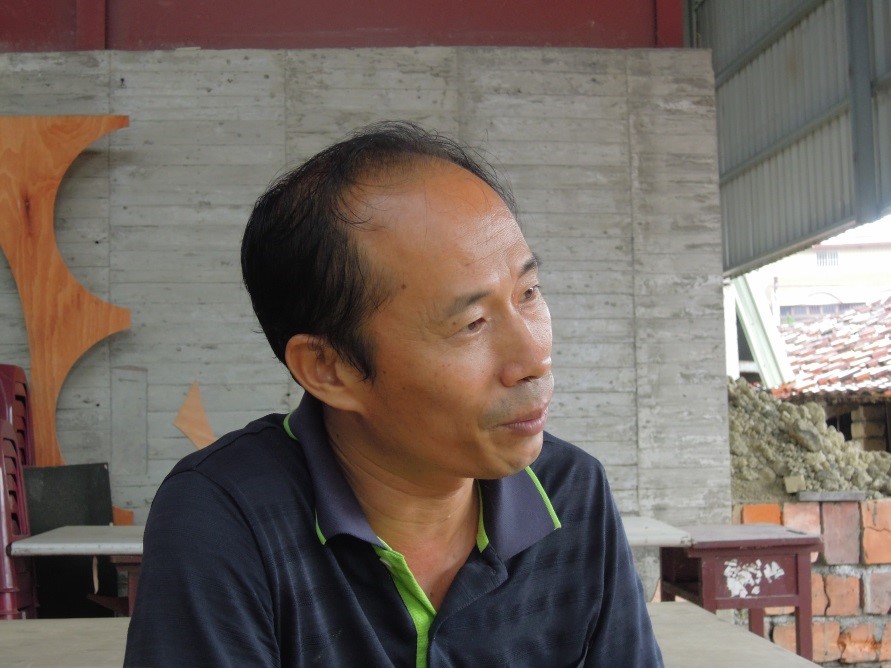
▲ Li wants to build a warm place just like a home.
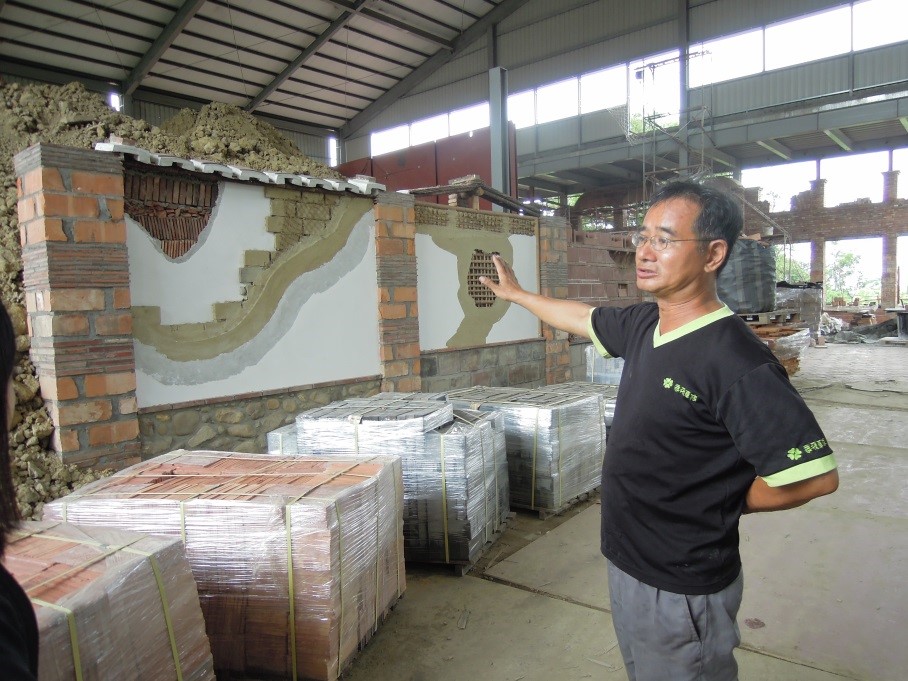
▲ Avolunteer introduces traditional construction methods and traditional building materials with the wall built by old methods.

This work is licensed under a Creative Commons Attribution-NoDerivatives 4.0 International License.
Please attribute this article to “Workforce Development Agency, Ministry Of Labor”.

